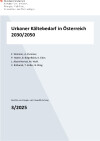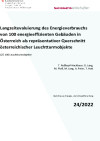Suchergebnisse für "Factsheet: Energietechnologien gestalten, die für alle sinnvoll und nutzbar sind"
SURO - Der städtische Untergrund als Rohstoffmine? Potential an Sekundärressourcen in der erdverlegten Infrastruktur
Machbarkeit eines Ressourcenkatasters zur Inventarisierung, Charakterisierung und Verortung der Materialbestände in den erdverlegten Infrastrukturnetzwerken österreichischer Stadtregionen. Das Ergebnis dient der ökonomischen Bewertung von Sekundärrohstoffpotenzialen.
Urbaner Kältebedarf in Österreich 2030/2050

Systematische Aufarbeitung des steigenden Kühlbedarfs und Darstellung der geographischen Verortung des Kältebedarfs in Österreich. Das Ergebnis dient als Entscheidungshilfe bei der Entwicklung von Klimaschutzmaßnahmen und Klimawandelanpassungsstrategien sowie eine Abschätzung zum Kältebedarf der Zukunft.
Schriftenreihe
3/2025
F. Wimmer, A. Pummer, P. Holzer, B. Beigelböck, K. Eder, L. Abart-Heriszt, M. Wolf, C. Rzihacek, T. Keller, B. Kling
Herausgeber: BMK
Deutsch, 91 Seiten
Downloads zur Publikation
Designing Synergies. Spatial and Energetic Transformation Scenarios for Small Towns and Municipalities Using the Example of the Wagram Region (Lower Austria).
An interdisciplinary exploratory project that synergistically analyses strategies for the activation of vacant buildings and the potential for the formation of small-scale energy communities. The starting point is student projects from the Institute of Architecture and Design, TU Wien, for four municipalities in the Wagram region. On this basis, an interdisciplinary team of experts is developing a concept for a synergy cluster focussing on spatial energy planning, building physics, the circular economy and social innovation.
Langzeitevaluierung des Energieverbrauchs von 100 energieeffizienten Gebäuden in Österreich als repräsentativer Querschnitt österreichischer Leuchtturmobjekte (LZE 100 Leuchtturmobjekte)

Erfassung, Auswertung und Analyse von Energieverbrauchsdaten von 100 energieeffizienten Gebäuden in Österreich über eine Betriebszeit von 3 bis 25 Jahren als repräsentativer Querschnitt der österreichischen Leuchtturmobjekte. Differenzierung nach Gebäudetypen, Energieträger und Ermittlung der realen Treibhausgas-Emissionen. Vergleich der gemessenen Verbräuche zu Benchmark-Werten.
Schriftenreihe
24/2022
T. Roßkopf-Nachbaur, G. Lang, M. Ploß, M. Lang, A. Peter, T. Hatt
Herausgeber: BMK
Deutsch, 143 Seiten
Downloads zur Publikation
Urban Sky - Satellite-based planning and analysis applications for climate-neutral and resilient cities
The project investigates how satellite data can support cities and municipalities (e.g. urban development, spatial energy planning, mobility transition). Based on demand and potential analyses, service concepts will be derived that integrate existing data and tools with satellite applications. The results will be presented in a study and a Space4Cities implementation roadmap.
GeoDatKlim - Geo Data and Satellite Data for Carbon Neutral Cities
The Vienna Geospace Hub innovation lab will help optimize the application of geospatial and satellite data to solve complex urban challenges. The innovation lab serves as a networking platform for administration, science, economy, as well as a development and test environment for innovative use cases.
Urban district heating extended – Development of flexible and decarbonized urban district heating systems
Development of innovative urban district heating systems by integration of long-term thermal storage, large scale heat pumps, large scale solar thermal installations, waste heat recovery and analysis and evaluation by simulation. The results of this project will provide templates for technology selection, system design and merit order for new urban district heating areas.
Green facades with moss plants
Development of moss-covered facade panels by selecting and testing of appropriate moss species, new water storage and adhesive substratum, Materials of the support panels and technical construction details, for year-round green, sustainable, maintenance friendly, affordable building facades
SC_micro-quarters – Planning and modernisation of smart city quarters with a view to energy optimisation and a high quality of life
The SC_micro-quarters project demonstrates possibilities for urban planning and urban quarter development with a view to creating a path to a low carbon city with a high quality of life and good resilience, while taking into account existing and proposed buildings, infrastructures and uses. The central element is the modelling of urban structures at micro-quarter level.
StromBIZ - demonstration projects: business models for decentralized electricity generation and distribution
Feasible business models to utilize locally generated renewable energy are expected to induce a tipping point for the "Energy Turnaround" in Austria. Within the proposed project a number of demonstration PV plants on residential and non-residential buildings had been realized. On this basis new approaches of business cases had been developed, implemented, tested and disseminated.
Digital Submission - Preparation of planning and decision-making processes, digitisation of building permit procedures (D-SUB)
The aim of this project was to develop and evaluate the foundation for the implementation of digital processes for building permit procedures in Styria. The project started with the recording, processing, and validation of the actual processes of building permit procedures of the city of Graz and the municipality of Stainach-Pürgg.
ÖKO-OPT-QUART - Economically optimized control and operating mode of complex energy networks of future city districts
In the project ÖKO-OPT-QUART energy-based, economic and control-orientated models will be developed in order to simulate the operating mode of complex, sustainable energy networks in city districts. For an exemplary configuration these models will be combined to an overall model which allows a realistic economic comparison of different control strategies. The final goal of the project is the development of a method for the systematic design of cost-optimized, predictive control strategies for complex energy networks in city districts.
LOW TECH innovation-lab - real laboratory for the transformation to climate and resource-saving energy regions with innovative LOW TECH solutions
LOW TECH innovation-lab aims to set up an innovation laboratory in which innovative model solutions are developed, tested and widely rolled out in cooperation with suitable pilot regions on the basis of an optimized approach with regard to the use of technology on the one hand and the potential of the circular economy, local environmental resources and social innovations on the other.
Digitalization in Urban Planning: From Spatial Energy Planning to Digitalization in Construction Engineering (PBM_integrativ)
The project provides a comprehensive overview of conditions and interrelations between administration, economy and planning and to elaborate the most important features and deficits in the flow of relevant information between the different phases of a building’s life cycle - planning, construction and management/administration.
REal - The laboratory for Integrated Regional Renewable Energy Systems
In the REal project, a holistic, scalable and user-friendly concept is created, whereby sector-coupled, municipal energy systems with 100% renewable energy can be implemented, considering all necessary aspects from planning to operation, reducing design costs and accelerating an Austria-wide implementation.
Green SandboxBuilder - Regulatory sandboxes in the field of sustainable construction and renovation
In the "Green SandboxBuilder" project, for the first time in Austria, the need for regulatory sandboxes for ecologically sustainable and climate-effective projects in the building sector had been systematically explored. The implementation of regulatory sandboxes in the Austrian construction sector can contribute to decisively accelerating the introduction of technological, procedural and social innovations and thus to achieving the sustainability goals.
urban pv+geotherm - Innovative concepts for the supply of large volume buildings/ quarters with PV and geothermal energy
The use of renewable energies in inner city locations is mostly linked to higher costs andconsidered as problematic. The aim of this project was to optimize (cost and energy) heating (and where required, cooling) using geothermic and photovoltaic for an urban, densely-built development area. With the project´s findings it will be easier to ecologically and economically plan the use of renewable energies especially in urban areas.
BIMaterial Process Design for Material Building Pass
Building Information Modelling supported compilation of a Material Building Pass; as a qualitative and quantitative documentation of the material composition of, and the material distribution within, a building structure. This project is a central milestone towards standardized, BIM-generated building material passes.
Reallabor Weizplus - Reallabor climate-neutral region Weizplus
Clarification of relevant questions for the potential establishment of a real lab in the region of Weizplus, which aims at a 100% supply of the region with renewable energies by 2030. The content-related technological focus of the activities of the future real lab is on all energy-relevant sectors (heating, electricity, cooling) applied to the focal points of energy efficiency and replacement of fossil energy in buildings, in trade and industry as well as mobility.
Digital transformation of the Austrian construction industry and its impact on employment
What are the impacts of the digital transformation of the Austrian construction industry on this sector’s labour market? By looking at the next five to ten years it will be analysed whether and to what extent digital applications lead to an increasing, falling or stagnant demand for employees in the construction industry and in construction occupations.
